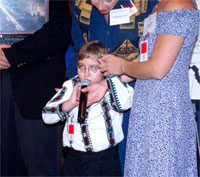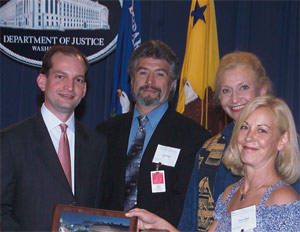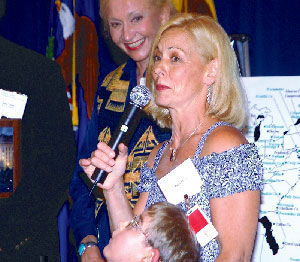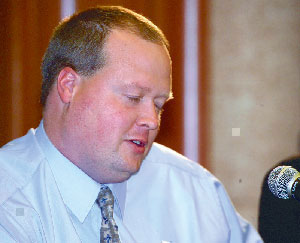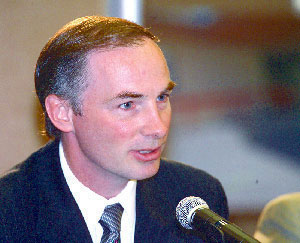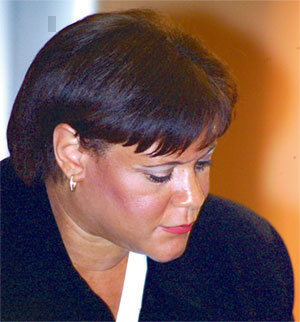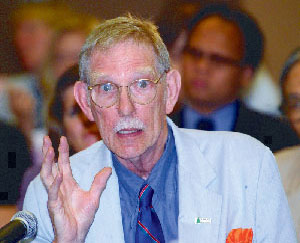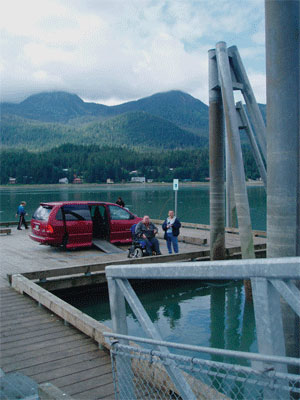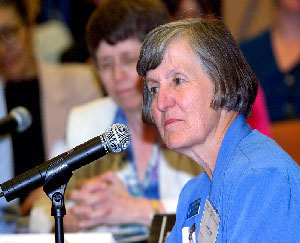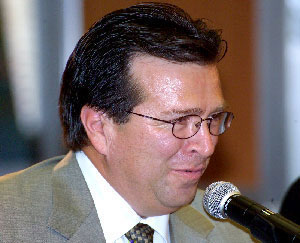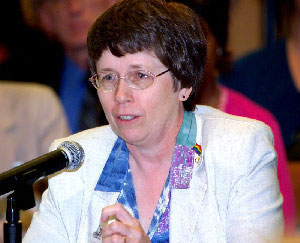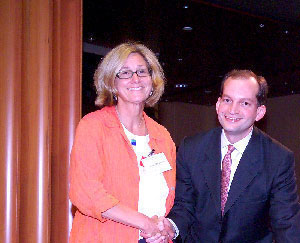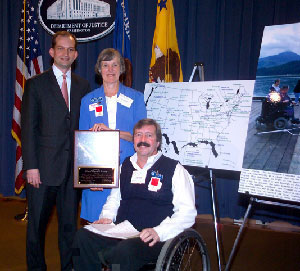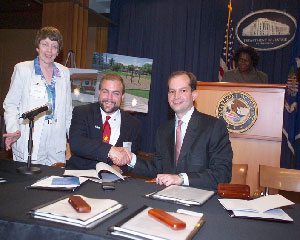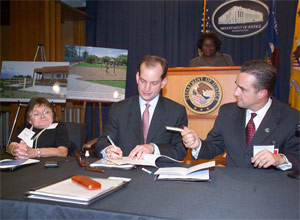|
|
Disability Rights online News |
|
|
U.S. Department of Justice |
|
|
|
In his remarks, Assistant Attorney General Acosta announced the signing of twenty-four new Project Civic Access agreements, bringing the total to one hundred settlements. The communities which entered into these settlement agreements were Juneau, Alaska; Fountain Hills, Arizona; San Rafael, California; Vail, Colorado; Vail Recreation District, Colorado; Hayden, Colorado; Coral Gables, Florida; Citrus County, Florida; Chatham County, Georgia; Davenport, Iowa; Jeffersonville, Indiana; Frederick, Maryland; Brunswick, Maine; Burton, Michigan; Butler County, Missouri; Cape May, New Jersey; Taos County, New Mexico; Highland County, Ohio; Deschutes County, Oregon; Deschutes County 9-1-1 Service District, Oregon; Monroe County Conservation District, Pennsylvania; Minnehaha County, South Dakota; Lakewood, Washington; and Green Bay, Wisconsin. Following these remarks, city and county government representatives, community advocates, and individuals with disabilities from seven communities around the country participated in a round table discussion highlighting the positive impact that Project Civic Access has had in their communities. The communities represented were Juneau, Alaska; Flagstaff, Arizona; Davenport, Iowa; Brunswick, Maine; Santa Fe, New Mexico; Taos County, New Mexico; and Green Bay, Wisconsin. Participants discussed the strategies they used to comply with the ADA and praised the spirit of cooperation fostered by Department staff.
ROUND TABLE HIGHLIGHTSAt the Project Civic Access event, city and county government representatives, community advocates, and individuals with disabilities from seven communities around the country shared their experiences with Project Civic Access and the positive impact it has had in their communities.
Assistant Attorney General Acosta's Remarks of Aug. 5, 2004Early in his administration, President George W. Bush issued all of us in this administration a directive: "Whenever any barrier stands between you and the full rights and dignity of citizenship, we must work to remove it." And he gave a very simple reason. "We have to do this in the name of simple decency and simple justice." That challenge to us is called the New Freedom Initiative. The Civil Rights Division has taken that challenge seriously, and we have worked hard to see it through. Our record has been strong. Since fiscal 2001 we have reached over 1,000 agreements, consent decrees, and informal resolutions of disability rights matters. We have filed 75 lawsuits. And, we have built a successful mediation program, achieving nearly 800 resolutions on disability related complaints. Achieving compliance, whether it is through litigation or alternative dispute resolution, remains the core of our mission. Full compliance with federal disability law depends on a willing and robust litigation effort. But, it is important to emphasize that we cannot rely on litigation alone. Your presence here today is a testament to what can happen when we engage in compliance assistance and when we engage in cooperative relationships. You have made strong efforts to engage in that compliance assistance and cooperative relationships. Our ADA.gov website last year received over 25 million hits. Thus far in this year, we have received almost 24 million hits, averaging 64,000 hits a day; 64,000 instances when Americans from around this nation have visited our website and received answers to their questions. Our ADA hotline fields 120,000 calls per year. Callers receive one-on-one assistance about specific requirements.
With the upcoming elections, we have published extensive guidance for local election officials teaching them how to make polling places accessible. And, for the first time ever, the Department of Justice this year will be training civil rights election monitors and observers on voting accessibility requirements These resources will go a long way toward heading off problems before we get into litigation. It is important to emphasize that, for this to work, we must have effective and clear rules and regulations. We continue to clarify our own regulations to make sure that they are easily understood and that they provide the required access.
According to a Department of Labor study, these 50 million individuals wield $175 billion in purchasing power. And that doesn't begin to count the purchasing power of their families and their friends. These Americans are incredibly loyal customers. When they find a place that is accessible, they will go back and they will tell their own friends about this place. This is a wide, untapped market. In fact, individuals with disabilities wield twice the purchasing power of teenagers. Think about how much energy is spent by American businesses marketing to teenagers. What this tells you is that there is an untapped market for business. And that is the message of our ADA Business Connection. Individuals with disabilities for example spend $35 billion annually in restaurants alone. So, our Business Connection makes the message clear that accessibility is not only required by law, but makes business sense. We travel the nation, bringing businesses together with individuals with disabilities in their community. We have businesses that have brought accessible services talk to other businesses about why this makes business sense. I was at a small business conference recently and I came across a manufacturer of a speech recognition program for the Blackberry. I asked them, "Have you been marketing to individuals with disabilities?" They said, "No." They said, "We don't know how. It will probably be too expensive." This struck me as remarkable shortsighted. If there is a use for voice recognition, it is with individuals with certain disabilities. The fact that they are not marketing to these individuals makes no business sense. If businesses get the right information, if they realize that there is a market, they will increase accessibility for themselves. I want to talk about another area in which we've been particularly active, enforcement of CRIPA, the Civil Rights of Institutionalized Persons Act. Under CRIPA the Department of Justice is authorized to investigate patterns and practices of violations of federally protected rights at state-operated institutions. Our investigations have unearthed some truly horrifying facts: neglect and abuse; residents being punched and kicked by staff; and suicidal children being left unattended and unsecured. At one facility in Louisiana we found evidence of staff dragging residents across the carpets; of staff kicking residents; of staff placing a blanket over a resident's head and proceeding to hit him, to punch him; of staff slapping a six-year old resident on the head and putting a rag over her nose and mouth; and of staff pulling a resident's hair so hard that her head went from side to side. We now have that facility under a CRIPA decree. And we have brought other facilities under CRIPA decrees. Our record with respect to CRIPA is strong. Since 2001 we have opened 44 investigations, nearly doubling the rate of investigations over the prior three and a half years. And, already this year we have brought 13 investigations under the Civil Rights of Institutionalized Persons Act. Let me add that this is not only a civil problem, this is a criminal problem. Between private individuals, such conduct is assault; it should be no different in an institution. Our approach in these cases is clear: when the state takes responsibility for some of the most vulnerable in our society it shoulders an obligation to provide legally adequate care and to protect them from harm.
Let me turn to Project Civic Access, the reason that brings us together today. Last month, President George W. Bush honored the ADA on its 14th anniversary and spoke about Project Civic Access as a method to integrate individuals with disabilities more fully into community life. Through Project Civic Access we go into communities and we work to ensure that people with disabilities have equal access to public facilities. We go to courthouses, libraries, parks, cities, city halls, recreational facilities, and, where appropriate, even to fishing docks. Our teams have spent hours, days, months, traveling the country with the accessibility guidelines, with tape measures, working with city officials. Often the city officials that accompanied them made changes right on the spot. Where they couldn't make changes on the spot, they committed to make the changes and notified us when the changes were made. This has made a world of difference. Your work means that city halls, libraries and courthouses in dozens of cities are now open, that doors and elevators are now accessible, that playground and picnic areas are no longer exclusive. A lot of these fixes are very simple. There's a picnic table poster out in the hallway, that simply points out by extending the picnic table a little bit you allow individuals with disabilities to roll wheelchairs up to the picnic tables and participate more fully. And it just takes individuals with heart and with time to make these changes. And that's exactly what happened. And in short this means freedom. It means a new freedom, access to use, to enjoy civic opportunities on the same basis as everyone else. And that really is the promise of the ADA. After today's ceremony we will have signed 100 settlement agreements, 100 towns whose public facilities and programs promise this new freedom. In his first minutes as president, George W. Bush spoke of an unfolding American promise. On the steps of the Capitol, in his inaugural address, he spoke of an unfolding American promise that everyone belongs, that everyone deserves a chance, and that no insignificant person is ever born. And he called this promise the grandest of the American ideals. And that really is why we're here today, to fulfill that promise and that ideal. Thank you. ACCESS TO CIVIC LIFE, A RIGHT GUARANTEED TO ALL AMERICANS
|
| Project Civic Access is a wide-ranging initiative to ensure that state, county, city, town, and village programs and activities comply with the ADA, allowing people with disabilities to participate in the civic life of their communities. |
The ADA's requirements for cities, counties, and other forms of local government went into effect in January 1992. Initially, the Department of Justice's enforcement efforts concentrated on resolving discrete problems brought to its attention through citizen complaints. Subsequently, the Department has developed a more comprehensive approach to compliance -- Project Civic Access. Under Project Civil Access, the Department performs a bottom up review of entire municipalities' and counties' public spaces and services.
Department investigators have surveyed state and local government facilities and evaluated government programs around the country to determine if they are, in fact, accessible to people with disabilities. Department investigators have now worked with over 100 state and local governments to bring them into compliance with the ADA. The initiative has addressed not only accessibility for those with physical disabilities but also those with vision, speech, hearing, or other non-physical disabilities.
| Through Project Civic Access, the Department has found that the vast majority of communities are aware of their ADA obligations and have made progress in meeting them. |
Through Project Civic Access, the Department has found that the vast majority of communities are aware of their ADA obligations and have made progress in meeting them. Investigators discuss their findings with local officials and draft settlement agreements to resolve any outstanding issues.
|
Typical issues addressed during the Project Civic Access
|
![]()
ADA COMPLIANCE ASSISTANCE AVAILABLE TO ALL
The ADA is the first civil rights law to require the government to help people and organizations understand their rights and responsibilities under the law. This is no small task: the ADA covers more than six million businesses, 80,000 units of State and local government, and 50 million people with disabilities.
To meet this challenge, the Department maintains a toll-free ADA information line and an ADA website. Through the information line, callers can order a wide range of free technical assistance materials addressing a wide range of ADA topics. Callers can also speak to an ADA specialist who can offer expert advice on how the ADA applies in their specific situation. The website is an on-line resource where users can read or download a large variety of ADA technical assistance publications, settlement agreements, press releases, and other information published by the Department. Over one million people use these services annually.
| The ADA requires Federal agencies to help people and organizations understand their rights and responsibilities under the law. This is no small task: the ADA covers more than six million businesses, 80,000 units of state and local government, and 50 million people with disabilities! |
Some of the materials available through the website and information line are written specifically for state and local governments. These resources ease the burden of compliance with the ADA and help increase accessibility for all. The booklets entitled "ADA Guide for Small Towns" and The "ADA and City Governments: Common Problems" review the ADA's requirements and offer practical examples of ways they can be met in cities and small towns. Another publication, the "ADA Checklist for Polling Places," is a 43-page guide for election officials to ensure that their voting process is accessible. These are just some examples of a range of publications the Department offers that focus on civic access.
User-friendly compliance assistance materials aimed at State and local governments can be obtained from the ADA website at archive.ada.gov or from the ADA information line at 1-800-514-0301 (Voice) or 1-833-610-1264 (TTY).
Both the website and the information line offer other materials written for businesses and the general public.
![]()
October 09, 2008

